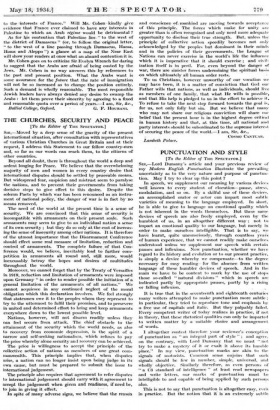rHE PROBLEM OF PALESTINE [To the Editor of Tim SPECTATOR.]
Sni,—In his criticism of Sir Evelyn Wrench is excellent article on Palestine, Mr. Israel,. Cohen firstly finds it "dis- quieting " that people still persist in believing that a promise was made to the Arabs in Palestine. This merely proves that he who shouts loudest does not always gain his point. The letter of Sir Henry McMahon (dated October 24th, 1915) to which Mr. Cohen refers can only be construed as a plain promise of freedom to all the Arabs, subject to two con- ditions. The first of these was correctly described by Colonel Lawrence in the words, " . . conditional on an Arab
revolt." . _
At this point Mr. Cohen confuses the issue by making a false distinction between Arabs and Palestinian Arabs. There is nothing of this in the original letter : the condition was simply an Arab revolt,", and in fact this condition was handsomely fulfilled. The second: condition is also stated accurately in Col. Lawrence's words, " . . except where Great Britain is not free to act without detriment to the -interests of France." -Will Mr. Cohen' kindly give evidence that France ever claimed to have any interests in Palestine to which- an Arab re,gime would be detrimental ?
As 'for his contention that Palestine lies." to the west of the district- of Damascus '-' (or, to follow. the original letter, " to the west of a line passing through Damascus, Hama, Horns -and Aleppo ") a glance at a map of the Near East will show your readers at once what an absurd contention it is.
Mr. Cohen goes on to criticize Sir Evelyn Wrench for daring to suggest that the Arabs are afraid of being ousted by the Jews. Mr. Cohen in no way answers this by references to the past and present position. -What the Arabs want is some assurance for the future that the rate of immigration will not be so increased as to change the position entirely. Such a demand is •wholly reasonable. The most responsible Jewish leaders have always denied any desire to swamp the Arabs : let them prove their sincerity by agreeing to a fixed and reasonable quota over a period of years.—I am,• Sir, &c.,









































 Previous page
Previous page